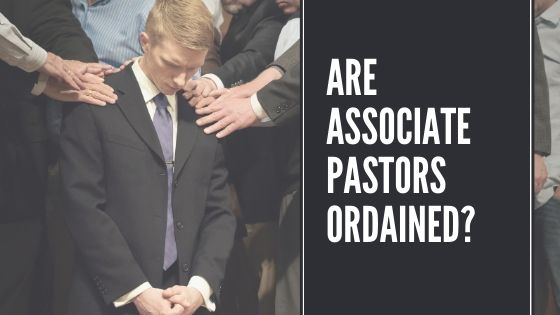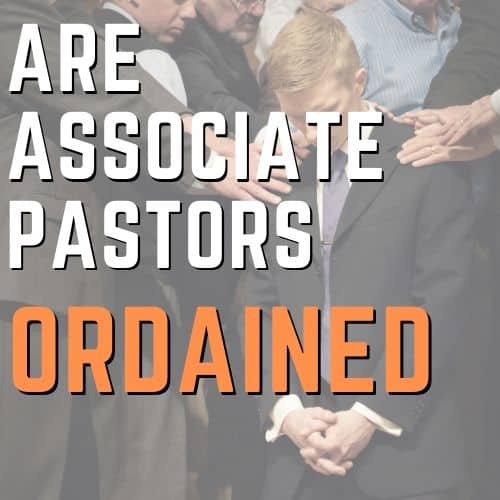
Often when new to the ins and outs of church staffing and politics, it is hard to know where some jobs start and others end. This raises the question of “are associate pastors ordained?”. The answer is that usually an associate pastor is ordained before taking the moniker of “Pastor”. Prior to ordination often other titles such as “assistant” or “administrator” are used.
What is ordination?
While the process of ordination differs depending upon the denomination, essentially ordination is the affirmation of a person by the church. This affirmation is to the formal leadership role associated with the title of pastor.
In the evangelical world, the terms Pastor, Bishop, Elder, or Decon are essentially used interchangeably. This comes from the formation of the New Testament church throughout Acts and Romans as well as the letters from Paul. Throughout these books, the terms are used almost indiscriminately.
- Acts 20:17, 28-30
- Overseer, Pastor, and Shepherd being used interchangeably.
- Titus 1:5-9
- Elder and Bishop both used to talk about qualifications for the role.
- 1 Peter 5:1-3
- Elder and Shepherd over the flock.
Ordination, in Christian churches, a rite for the dedication and commissioning of ministers. The essential ceremony consists of the laying of hands of the ordaining minister upon the head of the one being ordained, with prayer for the gifts of the Holy Spirit and of grace required for the carrying out of the ministry. The service also usually includes a public examination of the candidate and a sermon or charge concerning the responsibilities of the ministry.
Encylopaedia Britanica
What does the bible say about ordination?
The term “ordination” isn’t used in the same context we use it today. The term now encompasses a general affirmation by the church of a man, who is fully repentant of sin and called to the service of the church.
In Acts 13 we see a sort of “setting apart” as well as a direct calling from God to serve in the church.
Acts 13:2-4 (ESV)
What is an associate pastor?
Often when a church becomes large enough to warrant additional pastoral staff the first stop is an associate pastor. The role of the associate pastor (AP) is usually more directed towards the office as opposed to the pulpit. This frees up the administrative time previously allotted to the senior pastoral staff, allowing them to focus on the sermons instead of the suggestion box.
In many churches, the term associate pastor is changed to an assistant pastor or church administrator. The terms are interchangeable and often all used depending on the setting. The only true way to know an associate pastor’s title is often to check their email signature.
Within the ambiguous space, the role of the backup pastor is rarely conveyed. Most churches have such a burden and logistics ladened associate pastor that the role of “pitch hitting” sermons will usually fall to a guest pastor or an Elder/Deacon. In my experience rarely is sermon delivery a job duty. Usually, if preaching is within the standard duties, the prefix of “associate” is removed and then the “Senior” pastor is used to differentiate the main speaker from the secondary speakers.
What does the Bible say about associate pastors?
There are unfortunately no clearly defined roles for an associate pastor in the Bible. Although, with some mindful exposition the “role” is seen repeatedly. Throughout the New Testament Paul is sending and coordinating “helpers” to go to various churches and serve. These men could be seen as associate pastors to Paul.
2 Corinthians 8:23 (ESV)
Who can be an associate pastor?
It is important to remember the role of an associate pastor varies depending on the specific needs of the church. Although there are some general things that are more suited to the administrative roles usually undertaken by an associate pastor.
Associate pastors come from varied backgrounds and vocations. There are no “industry standards” for what specifics an associate pastor must possess prior to taking a position. However, there are some general things most associate pastors will have as a bare minimum.
- Legal ability to work in the country
- A high school diploma
- An affiliation with a perspective denomination
- Clerical and administrative skills
Standard job qualifications and requests will usually be expecting a bit more from a prospective associate pastor. These additional traits include some of the following.
- Bachelor’s Degree is the minimum education for most smaller churches
- Master’s Degree is a standard for large churches, usually in a religious study or business, often humanities degrees will work well for these positions
- Experience working within a church
- 3-5 years of applicable administrative or clerical work
How can an associate pastor become ordained?
Ordination is something that ever denomination does differently. There is no legal standard. Right now, you can go online and become “ordained” with a few clicks.
However, the TURE ordination is an agreement between a church and a pastor. This agreement can take a few different forms, but the usual way if for a church body to ordained a pastor through a series of affirmations.
General ordination practice
- This will usually start with the Senior Pastor and other church leadership asking the un-ordained pastor to stand and come forward. Then they will read scripture, church by-laws, or another prepared statement.
- Then the new pastor will affirm or agree to the above statements.
- Finally, the church will, as a body, affirm the new pastor within the church.
The formality and ceremony truly depend on the respective church. I have seen this done in flip flops as part of a church beach-day/baptism, as well as the more traditional suit and tie affair. The church culture will determine how the leadership will bolster its ranks.
What are the benefits of ordination?
There are some interesting benefits of ordination.
- Preform weddings
- Conduct some types of Counseling
- Perform funerals
- Work as a Chaplain
Weddings
All that is required to perform a wedding in most states it to sign on the marriage certificate/license. To do this, you just need to put your name, ceremony type, and denomination.
While this may seem to almost cheapen the entire endeavor, this is a great opportunity to help your Senior Pastor. In a large church, it isn’t uncommon to have a few weddings a month during the spring and summer. While this is a joyous thing, it can be very time consuming to have your Senior Pastor forgo sermon prep every Saturday for a month. With the ability to perform most of the weddings for the church, an ordained associate pastor can free up much needed time and bandwidth for the Preacher.
Counseling
Often churches perform pre-marital counseling to church members prior to performing a wedding ceremony. This a great role for an associate pastor to undertake do to the primarily logistical nature of most sessions. Pre-marital counseling usually doesn’t delve deeply into theological matters. Finances, children, and roles within the family are the main topics. All of these are common for an associate pastor to handle or counsel the church body over on a regular basis, though it is usually more focused and intimate in the pre-marital setting. Along with this counseling comes the building of comfort and rapport with the associate pastor. So when he performs the wedding, there is already a relationship formed and bond developed.
Chaplain
A chaplain works as a spiritual guide to the world. That is about as deep theologically as you are allowed to get in some places.
While most full-time jobs will require an M-div, some part-time or volunteer positions do not. Often for most volunteer positions, all that is required is “spiritual or religious” training or ordination.
This gives some real-world experience to newer associate pastors as well as an opportunity to serve the community. Chaplains are often found in the hospital to help patients and families deal with troubling news or the loss of a loved one. Many Fire and Police Departments offer chaplain services to responders upon request or following traumatic events. This is an awesome chance to help those that help you!
When I was working as a paramedic we had some mandatory “sit-downs” with the chaplain. After a few truly horrific calls, my Captain would pull the entire unit out of service and begin a Critical Incident Stress Debriefing (CISD). This was policy following specific types of calls, or in obvious distress was noted in the crews.
-Josh
Funerals
Along with chaplain services comes the performance of funerals. These luckily don’t seem to happen as much as the wedding in my current church. However, this can be a large time investment for a senior pastor to allot. Being able to handle these will free up much needed time for other matters while making sure that the church members are properly cared for.
In summary
- An associate pastor does not need to be ordained
- An associate pastor is usually ordained before becoming “pastor”
- An ordained associate pastor can increase the efficiency and effectiveness of a Senior Pastor
- An ordained associate pastor can better serve the church





